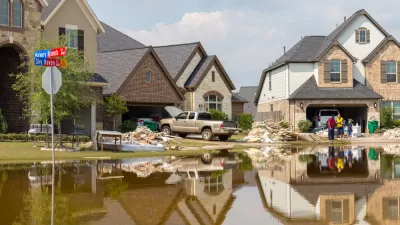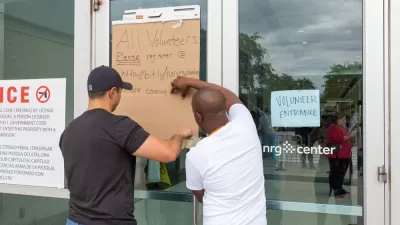Resilience, as such, isn't a problem. But Alex Beam takes issue with the current flood of resilience-related jargon. Can you blame him?

Alex Beam has a problem with "resilience," as in the cottage industry that has sprung up around that concept. "Resilience means the ability to bounce back after adversity," a simple trait that most people, and most cities, possess to a certain degree. But what about the constant talk of resilience, so often turning it into some undefined holy grail in the realm of the public good?
Beam highlights the jargony prose that characterizes resilience-speak, no doubt well-intended but lacking in the common sense department. "[The Rockefeller Foundation] is all in on resilience, with a Global Resilience Partnership, the National Disaster Resilience Competition, and the 100 Resilient Cities program, in which Boston is participating. Among the resilience officers' duties, the foundation's website explains, is 'ensuring that the city applies a resilience lens so that resources are leveraged holistically and projects planned for synergy.'"
The point: resilience may be joining "sustainability" as a word that has been done to death. As Beam puts it, "Resilience talk is just a little too glib, a little too modish, a little too nonsensical for my tastes. Americans seem to me like the least resilient people on earth, obsessing over bathroom access and Twitter wars while one-tenth of the planet starves to death. Starbucks ran out of one percent milk? I'm calling my congressman!"
FULL STORY: What’s all this talk about resilience?

Study: Maui’s Plan to Convert Vacation Rentals to Long-Term Housing Could Cause Nearly $1 Billion Economic Loss
The plan would reduce visitor accommodation by 25,% resulting in 1,900 jobs lost.

North Texas Transit Leaders Tout Benefits of TOD for Growing Region
At a summit focused on transit-oriented development, policymakers discussed how North Texas’ expanded light rail system can serve as a tool for economic growth.

Why Should We Subsidize Public Transportation?
Many public transit agencies face financial stress due to rising costs, declining fare revenue, and declining subsidies. Transit advocates must provide a strong business case for increasing public transit funding.

How Community Science Connects People, Parks, and Biodiversity
Community science engages people of all backgrounds in documenting local biodiversity, strengthening connections to nature, and contributing to global efforts like the City Nature Challenge to build a more inclusive and resilient future.

Alabama: Trump Terminates Settlements for Black Communities Harmed By Raw Sewage
Trump deemed the landmark civil rights agreement “illegal DEI and environmental justice policy.”

Dear Tesla Driver: “It’s not You, It’s Him.”
Amidst a booming bumper sticker industry, one writer offers solace to those asking, “Does this car make me look fascist?”
Urban Design for Planners 1: Software Tools
This six-course series explores essential urban design concepts using open source software and equips planners with the tools they need to participate fully in the urban design process.
Planning for Universal Design
Learn the tools for implementing Universal Design in planning regulations.
City of Santa Clarita
Ascent Environmental
Institute for Housing and Urban Development Studies (IHS)
City of Grandview
Harvard GSD Executive Education
Toledo-Lucas County Plan Commissions
Salt Lake City
NYU Wagner Graduate School of Public Service





























